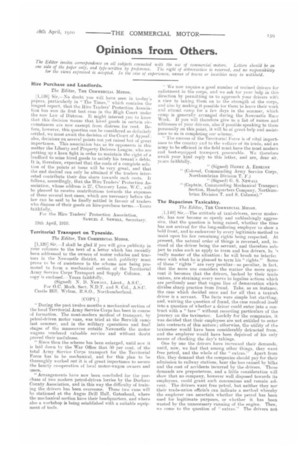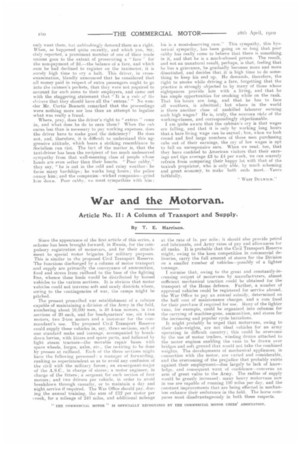Opinions from Others.
Page 17

Page 18

If you've noticed an error in this article please click here to report it so we can fix it.
The Editor invites correspondence on all subjects connected with the use of commercial motors. Letters should be on one side of the paper only, and type-written by preference. The right of abbreviation is reserved, and no responsibility for the views expressed is accepted. In the case of experiences, names of towns or localities ntay be withheld.
Hire Purchase and Landlords.
The Editor, THE COMMERCIAL MOTOR.
[1,138] Sir,—No doubt you will have seen in tu-day's papers, particularly in " The Times," which contains the longest report, that the Hire Traders' Protection Association has won it,s first test case in the High Court usider the new Law of Distress. It might interest you to know that this decision means that hired goods in certain circumstances are now exempt from distress for rent. Before, however, this question can he considered as definitely settled, we must await the decision of the Court of Appeal ; also, decisions on several points not yet raised hut of great importance. This association has as its opponents in this matter the Liberty and Property Defence League. who sire putting up a keen fight in order to maintain the right of a landlord to seize hired goods to satisfy his tenant's debts. It is, therefore, expected that the costs of a complete solution of the points at issue will he very great, and that the end desired can only be attained if the traders interested contribute their due share towards such costs. It follows, accordingly, that the Hire Traders' Protection Association whose address is 27, Chancery Lane. WC., will be pleased to receive contributions towards the expenses of these several test cases, which are necessary before the law can be said to be finally settled in favour of traders who dispose of their goods on hire-purchase terms.—Yours faithfully,
For the Hire Traders' Protection Association,
SAMUEL J. SEWELL, Secretary.
19th April, 1910.
Territorial Transport on Tyneside.
The Editor, THE COMMERCIAL MOTOR.
[1,139] Sir,—I shall he glad if you will give publicity in your columns to the text of a letter which has recently been addressed to the owners of motor vehicles and tractors in the Newcastle district, as such publicity must prove to he of assistance to the scheme now being promoted to form a mechanical section of the Territorial Army Service Corps Transport and Supply Column. A copy is enclosed.—Yours faithfully,
(Signed) N. D. Newsts., Lieut., A.S.C., For O.C. Mech. Sect. N.D.T. and S. Col., A.S.C. Castle Hill. Wylam, R.S.O., Northumberland.
[COPY.]
"During the past twelve months a mechanical section of the local Territorial Army Service Corps has been in course of formation. The most-modern method of transport; by petrol-driven motor vans, was tried at the Berwick camp last summer, and in the military operations and final stagesof the manceuvres outside Newcastle the motor wagons rendered valuable service and without doubt proved their usefulness.
" Since then the scheme has been enlarged, until now it is laid down by the War Office that 50 per cent. of the total Army Service Corps transport for the Territorial Force has to be mechanical, and for this plan to be thoroughly worked out it is of great importance to secure the hearty co-operation of local motor-wagon owners and users.
" Arrangements have now been concluded for the purchase of two modern petrol-driven lorries by the Durham County Association, and in this way the difficulty of training the drivers has been overcome. These two vans will be stationed at the Angus Drill Hall, Gateshead, where the mechanical section have their headquarters, and where also a workshop is being established with a suitable equipment of tools. We now require a good number of trained drivers for enlistment in the corps, and we ask for your help in this direction by permitting us to approach your drivers with a view to taking them on to the strength of the corps, and also by snaking it possible for them to leave their work and attend camp for a few days in the summer, which camp is generally arranged during the Newcastle Race Week. If you will therefore give us a list of names and addresses of your drivers, also if possible speaking to them personally on this point, it will be of great help and assistance to us in completing our scheme.
" The success of the Territorial Force is of vital importance to the country and to the welfare of its trade, and an army to be efficient in the field must have the most modern and best-equipped transport procurable. We therefore await your kind reply to this letter, and are, dear sir, yours faithfully,
"(Signed) HENRY A. ERSKEVE
" (Colonel, Commanding Army Service Corps,
Northumbrian Division T. F.) "(Signed) C. S. NEWALL " (Captain, Commanding Mechanical Transport Section, Headquarters Company, Northumbrian Division T. and S. Column)."
The Rapacious Taxicabby.
The Editor, Tim COMMERCIAL MOTOR.
1.140] Sir,—The attitude of taxi-drivers, never moderate, has now become so openly and unblushingly aggressive, that the question is being raised, whether the time has not arrived for the long-sulfering employer to show a bold front, and to endeavour by every legitimate method to insist upon his few remaining rights being respected. At present, the natural order of things is reversed, and, instead of the driver being the servant, and therefore subject to rules such as apply to tram and bus drivers, he 's really master of the situation : he will brook no interfet ence with what he is pleased to term his " rights." Some of these " rights " are very peculiar—so peculiar, in fact, that the more one considers the matter the more apparent it becomes that the drivers, backed by their trade unions, are straining every nerve to legalize actions which are perilously near that vague line of demarcation which divides sharp practice from fraud. 'fake, as an instance, the case which decided once and for all that a taxicab driver is a servant. The facts were simple but startling, and, waiving the question of fraud, the case resolved itself into a question of whether a driver could enter into a contract with a "fare " without recording particulars of the journey on the taximeter. Luckily for the companies, it was decided that their employees are not entitled to enter into contracts of this nature ; otherwise, the utility of the taximeter would have been considerably detracted from, and the employer would have been deprived of his only means of checking the day's takings.
One by one the drivers have increased their demands, until, now, we find that among other things, they wantfree petrol, and the whole of the extras." Apart from this, they demand that the companies should pay for their admission to railway stations, bear the loss caused by bilks and the cost of accidents incurred by the drivers. These demands are preposterous, and a little consideration will show that no company, however well disposed towards its employees, could grant such concessions and remain solvent. The drivers want free petrol, but neither they nor their trade-union officials can indicate a method whereby the employer can ascertain whether the petrol has been used for legitimate purposes, or whetherit has been wasted by the unnecessary running of the engine. Then, we come to the question of " extras." The drivers not
only want them, but usiblushingly demand them as a right. When, as happened quite recently, and which you, Sir,
duly reported, a prominent member of one of their trade unions goes to the extent of prosecuting a " fare " for the non-payment of 2d.—the balance of a fare, and which sum he had declined to register on the taximeter, it is :Surely high time to cry a halt. This driver, in crossexamination, blandly announced that he considered that all money paid in respect of extra passengers ought to go into the cabmen's pockets, that they were nut required to .account for such sums to their employers, and came out with the staggering statement that " It is a rule of the 'hirers that they should have all the extras.' " No wonAer Mr. Curtis Bennett remarked that the proceedings were nothing more nor less than an attempt to legalize what was really a fraud.
Where, pray, does the driver's right to " extras " conic in, and what does he do to earn them ? When the cab .earns less than is necessary to pay working expenses, does
the driver have to make good tile deficiency lie does not, and, therefore, it is difficult to understand this aggressive attitude, which bears a striking resemblance to socialism run riot. The fact of the matter is, that the taxi-driver has been the recipient of too much undeserved Lsympathy from that well-meaning class of people whose Leads are even softer than their hearts. " Poor cabby," they say, "lie is out in the cold and rainy weather : he faces many hardships; he works long hours; the police :annoy him; and the companies—wicked companies—grind Lim down. Poor cabby. we 11111st sympathize with him : his is a most-deserving case.This sympathy, this hysterical sympathy, has been going on so long that poor cabby has really come to believe that there is something in it, and that he is a much-abused person. The result, and not an unnatural result, perhaps, is that, feeling that he has a grievance, he gradually becomes more and more dissatisfied, and decides that it is high time to do something to keep his end up. He demands, therefore, the right to smoke while driving a fare, forgetting that the practice is strongly objected to by many of those whose eightpences provide him with a living, and that he has ample opportunities for smoking while on the rank. That his hours are long, and that he has to face all weathers, is admitted; but where in the world is there another class of unskilled labourer earning such high wages? He is, truly, the nouveau riche of the working-classes, and correspondingly objectionable. I am quite aware that the cabman's cry is that wages are falling, and that it is only by working long hours that a bare living wage can be earned ; but, when we look round and find large numbers of these men purchasing cabs out of their earnings, the cry of low wages is apt to fall on unresponsive ears. When we read, too, that they have confided to American visitors that their earn
ings and tips average to £4 per week, we can scarcely refrain from comparing their happy lot with that of the taxicab proprietor, who is only able, by much scheming and great economy, to make both ends meet, -Yours faithfully, " WEST DULWICH."






















